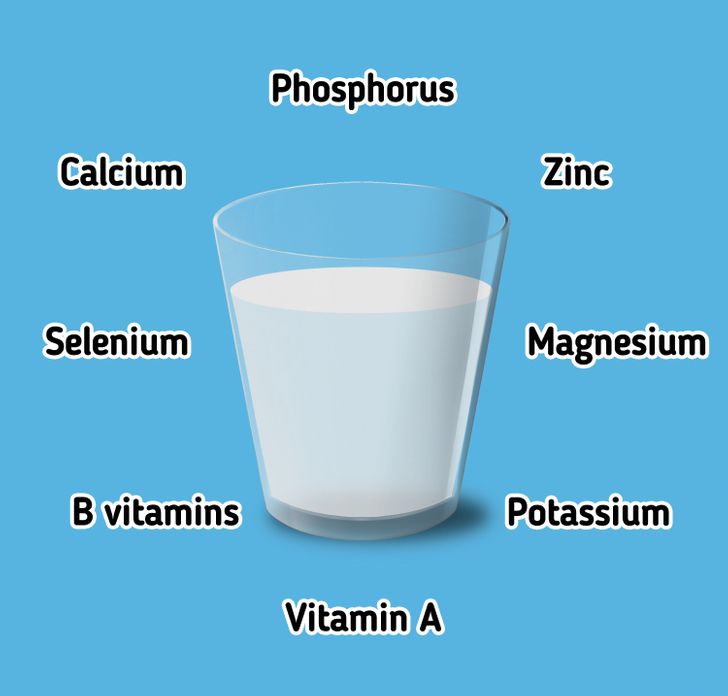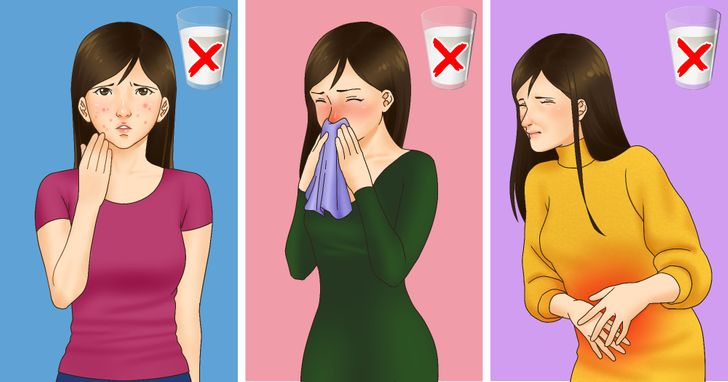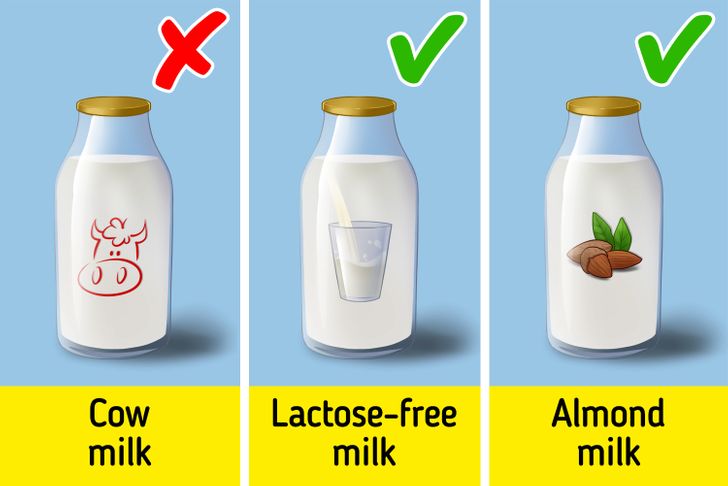Drinking Milk as an Adult: When It’s Safe and When It’s Not
Cow’s milk has been one of the main foods in people’s diets for thousands of years. Though it still remains popular, some research claims that milk can be harmful to the human body. Other research, on the contrary, shows that dairy products are healthy for us. How do we understand whether we need to keep consuming milk in adulthood or whether it’s better to reduce the amount?
5-Minute Crafts found out about the pros and cons of milk intake and wants to tell you in which cases it’s better to refrain from consuming it.
Benefits of milk

Milk intake has a number of benefits for your health:
- Milk is rich in vitamins and minerals including phosphorus, zinc, selenium, magnesium, vitamin A, and B vitamins.
- It is good for bones and teeth. A cup of milk contains almost 30% of the daily calcium requirement for an adult person. This mineral is important for dental and bone health. In addition, milk is often enriched with vitamin D, which promotes calcium absorption and minerals in the bones. One cup can contain up to 20% of the daily value of the vitamin.
- It’s good for the heart and blood vessels. Whole milk helps increase the level of “good” cholesterol, which in turn can lower the risk of heart disease. Among other things, milk is an excellent source of potassium. This mineral helps regulate blood pressure.
- It helps control body weight. A study, in which 49 people took part, found that dairy products can help you feel fuller for a longer time and reduce the amount of fat you eat. Another study confirmed that consumption of fatty dairy products is associated with lower body weight.
Can milk be harmful

Despite all the health benefits milk has, in some cases, its intake can lead to undesirable consequences. That is:
- Milk can worsen acne. A meta-analysis of 14 studies reports that dairy consumption may increase the risk of acne in people between the ages of 7 and 30. However, the authors of the study say that a clear connection between milk intake and the appearance of acne has not been established and the results should be interpreted with caution due to the heterogeneity of the initial data.
- It can cause allergies. The World Health Organization estimates that 1.9% to 4.9% of children are allergic to cow’s milk protein. Though, most often, it manifests itself during the first year of life, still, the reaction can appear at any age. For example, adults can develop allergies to dairy products even if they have been consuming milk without any issues before. Allergy symptoms include itching, redness of the skin, abdominal pain, tingling or swelling of the lips, tongue, or throat, runny nose, and watery eyes. If they appear, you need to urgently consult a doctor.
- It can cause lactose intolerance. There a widespread issue with digestion when a body cannot digest lactose — a type of sugar that milk and dairy products contain. This condition can develop at any age — many cases are first recorded in people from 20 to 40 years old. Symptoms usually appear within several hours after consuming dairy products and include bloating and bowel discomfort. Just like in the situation with allergies, you should consult your doctor if you suspect that you have a lactose intolerance.
When it’s better to refrain from drinking milk
Only in the aforementioned cases.
- In the case of acne, your doctor can recommend that you watch the situation, and note whether the amount of acne increases after ingesting dairy products. If there are some suspicions, you can try refraining from drinking milk for some time and see whether the condition of your skin improves.
- If you suspect you have allergies, your doctor can ask you to do some tests. They can help you understand whether the symptoms of the allergies are connected with milk intake or with some other disease. If you have an allergy, the tests will help to find out which specific product causes the reaction — perhaps it is not milk, but another type of food. But still, if it’s milk that acts as an allergen, the doctor may recommend avoiding the use of these products and prescribing an appropriate treatment.
- When there is suspicion of lactose intolerance you will also need to consult a doctor. If they believe that the symptoms are connected with this condition, they can ask you to avoid dairy products for a while and see how it affects your well-being. If the diagnosis is confirmed, reducing dairy intake in the diet usually helps control symptoms.
What to replace cow’s milk with

If your doctor recommends that you avoid dairy products, you can try to find alternatives for them. This can be:
- Lactose-free milk and lactose-free dairy products. They contain the same vitamins and minerals as standard dairy products. In addition, lactase — an enzyme that helps your body digest milk sugar and avoid unpleasant symptoms, is added to them.
- Alternative types of milk. For example, soy, almond, rice, oat, coconut, and other types of milk, as well as products based on them.
Keep in mind that milk and dairy products are sources of important nutrients, and you shouldn’t remove them from your diet without consulting your doctor. Eliminating dairy products without serious reasons can lead to a calcium deficiency. And this, in turn, can provoke problems with the health of your teeth and bones.